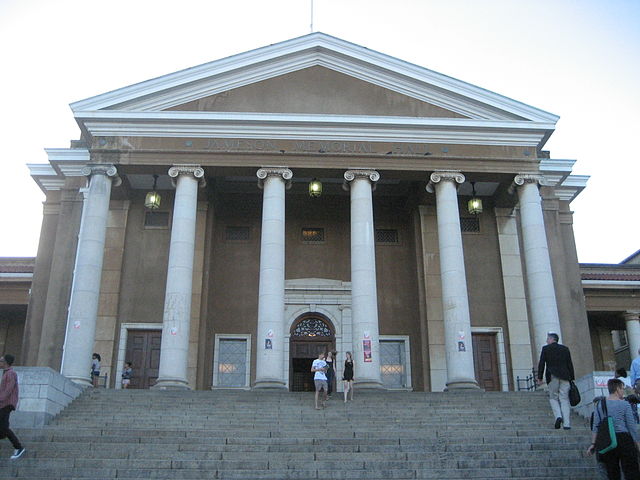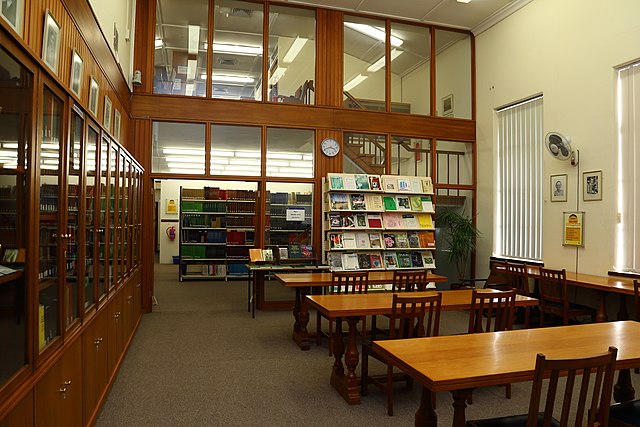University of Cape Town Libraries, South Africa
The University of Cape Town Libraries (UCT Libraries) are located in Cape Town, South Africa. They include a main library, the Chancellor Oppenheimer Library, and nine branch libraries on campus. The system owns about 1.2 million volumes, with access to over 100,500 print and online journal subscriptions. The Thammasat University Library owns a number of books either from University of Cape Town Press or published in Cape Town, South Africa.
As the UCT Libraries website notes, in 1905, Professor W. S. Logeman, a philologist in the Department of Modern Languages, was appointed Honorary Librarian, a post which he retained until 1920. He took steps to bring all the books accumulated in College departments together into one place … initially the old Zoology Lecture Room … where he arranged them systematically and catalogued them. Carefully nurtured by a dedicated altruist, the library began to grow and flourish, despite the rigours of the post-South African War economic depression in the Cape Colony.
Today, the director of UCT Libraries is Ms. Ujala Satgoor. Ms. Satgoor earned a bachelor of arts degree from the University of Durban-Westville, now one of the campuses of the University of KwaZulu-Natal, where she received an honors degree in Sanskrit studies. She also earned a post-graduate diploma in Library and Information Science at the University of Cape Town, South Africa.
She has published a number of interesting articles on such subjects as Celebrating libraries in 20 years of democracy: An overview of library and information services in South Africa.
As the website of the UCT Library and Information Studies Centre (LISC) indicates,
- The Library and Information Studies Centre (LISC) is the oldest Library and Information Science (LIS) School in Africa, having first opened its doors to students in 1939. LISC provides quality postgraduate programmes through innovative teaching and learning experiences based on a dynamic and relevant curricula. It remains a school of choice for LIS in Africa and offers courses such as Digital Curation, Research Librarianship, LIS Leadership and Management, Knowledge Management and Resource Description and Communication. These are some of the contemporary courses instrumental in providing students with vital skills to mediate a rapidly evolving ICT- driven information environment.
- Accordingly, LISC strives to produce a new generation of librarians and information professionals with competencies relevant to work in libraries as well as in corporate, government and non-governmental organisations where their skills are needed to manage the valuable assets of data and knowledge. Our graduates are integral to the knowledge economy and are hence trained to assist organisations to thrive in the knowledge economy. Thus our graduates are conversant with knowledge strategies, digital curation and linked data application and the organisation and management thereof for competitive advantage.
- In an evolving information landscape, driven by technological advancements and where the need for dynamic and relevant programmes is critical, LISC looks forward to, in the future, introducing blended learning and online options in its delivery of programmes.
She also received a master’s degree in information technology at the University of Pretoria.

The vision, mission, purpose, and strategic objectives of the UCT Libraries are as follows:
VISION
- To be an excellent library in a new time and space that forms a strategically strong research, teaching and learning support environment within UCT and brings in newness purposefully around a compelling and exciting common work purpose which is firmly grounded in a transformed, non-racial, inclusive and collegial workplace
MISSION
- The mission of UCT Libraries is to provide the best academic information services in support of UCT’s institutional goals and strategies.
PURPOSE
- The purpose of the UCT Libraries is to support the university’s strategic goal of becoming a distinguished institution by providing the means for discovery, pursuit and creation of new knowledge:
STRATEGIC OBJECTIVES
- in providing access to collections and services that directly support the academic and research priorities of the university;
- ensuring that the Libraries are adequately providing core services to faculty and students;
- positioning the Libraries to provide new services supporting the emerging teaching, learning and research needs of the university community and its various constituents;
- continuously assessing services to identify those no longer valued by users or that have become redundant or obsolete.
Enable research success
- Investigate, design and implement innovative support services for research success including interdisciplinarity and internationalisation;
- Lead, support and grow services that enhance the visibility, accessibility and discoverability of UCT’s research;
- and provide support services to facilitate measuring research excellence.
Support excellence in teaching and learning
- Investigate, design and implement innovative services and activities that help critical thinking flourish;
- Design programmes and activities to support access to digital teaching and learning content;
- Investigate, design and implement services and facilities in support of undergraduate students;
- and assess impact of the Libraries’ services and facilities on under- and postgraduate success.
Develop strong partnerships
- Develop strategies to enhance the visibility and sharing of unique UCT collections;
- Explore, engage and establish partnerships with key university departments and other stakeholders;
- Explore, engage and implement regional and national collaboration, including professional bodies;
- and explore and engage international collaboration.

UCT Libraries are currently engaged in a 5 year strategic plan to participate in social responsibility activities; optimise the inherent skills and capacity of staff for socially responsive activities; optimise relationships with professional bodies, NGOs etc. to support school education; and nurture, develop and motivate all staff.
Other goals include to recruit competent, dynamic and skilled staff in compliance with institutional policies and guidelines; develop and implement a staff retention strategy; align continuing education and professional development support with library strategy, actively encouraging participation and leadership over attendance alone; develop and sustain an appropriately skilled and engaged workforce that can succeed and flourish; and cultivate an organisational climate that promotes workplace harmony, collegiality, collaboration and teamwork.
Thailand and South Africa
In January, Thailand’s Tourism Industry Outlook 2019 published on the website of Kasikorn Bank, declared that tourists travelling from the US and South Africa to Thailand will continue to see positive growth trend.
Last year, The Bangkok Post reported that Airports of Thailand Plc (AoT) signed an agreement with Airports Company South Africa (ACSA) to extend air connectivity and improve joint marketing. Under the agreement, AoT and ACSA will focus on regular meetings; exchange of ideas and information on best practices; joint marketing; and joint work activities…In addition, the deal is expected to strengthen cultural exchange and boost travel and tourism between the two countries. According to statistics of the Tourism and Sports Ministry, 93,000 tourists from South Africa travelled to Thailand in 2017, up 17.8% year-on-year, with tourism receipts of 6.8 billion baht, up 20.5%.
(All images courtesy of Wikimedia Commons)


